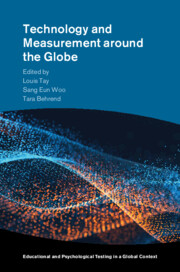Book contents
- Technology and Measurement around the Globe
- Educational and Psychological Testing in a Global Context
- Technology and Measurement around the Globe
- Copyright page
- Contents
- Contributors
- Introduction
- Part I Foundations
- Part II Global Perspectives on Key Methods/Topics
- Part III Regional Focus
- Index
- References
Introduction
Published online by Cambridge University Press: 08 November 2023
- Technology and Measurement around the Globe
- Educational and Psychological Testing in a Global Context
- Technology and Measurement around the Globe
- Copyright page
- Contents
- Contributors
- Introduction
- Part I Foundations
- Part II Global Perspectives on Key Methods/Topics
- Part III Regional Focus
- Index
- References
Summary
Technology, that is, the output of human innovation, has always been central to human progress worldwide. Early on, the ancients developed the wheel, concrete, calculus, and paper, which led to advances in transportation, construction, and communication. Today, the incarnation of technology falls in the realm of the digital and computational, and its progress has been rapid, even arguably exponential. In his chapter, “The Law of Accelerating Returns,” Ray Kurzweil writes, “An analysis of the history of technology shows that technological change is exponential, contrary to the common-sense ‘intuitive linear’ view. So we won’t experience 100 years of progress in the 21st century – it will be more like 20,000 years of progress (at today’s rate)” (Kurzweil, 2004, p. 381).
- Type
- Chapter
- Information
- Technology and Measurement around the Globe , pp. 1 - 8Publisher: Cambridge University PressPrint publication year: 2023



